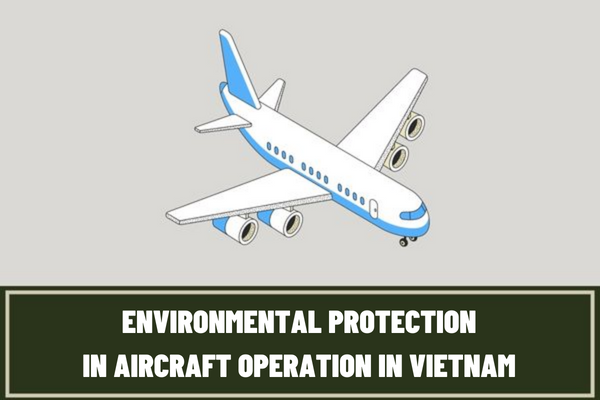Vietnam: Who are the aircraft operators according to the law? What are the regulations on environmental protection in aircraft operation in Vietnam?
Who are the aircraft operators according to the law?
Pursuant to Article 22 of the 2006 Law on Vietnam Civil Aviation on aircraft operators in Vietnam:
Aircraft operators in Vietnam
1. Aircraft operators are organizations and individuals engaged in operating aircraft.
2. Aircraft-operating organizations may operate aircraft for commercial purposes when they are granted aircraft operator certificates or have their aircraft operator certificates recognized by the Ministry of Transport.
Aircraft-operating individuals may not operate aircraft for commercial purposes.
Thus, aircraft operators are organizations and individuals engaged in operating aircraft.
- Aircraft-operating organizations may operate aircraft for commercial purposes when they are granted aircraft operator certificates or have their aircraft operator certificates recognized by the Ministry of Transport.
At the same time, aircraft-operating individuals may not operate aircraft for commercial purposes.
Specifically, an organization shall be granted an aircraft operator certificate if meeting the conditions specified in Clause 2, Article 23 of the 2006 Law on Vietnam Civil Aviation:
- Having an appropriate organizational apparatus and mode of management and supervision of operation of aircraft;
- Having employees who have been adequately trained and have appropriate permits and certificates;
- Having a professional training program and an aircraft maintenance program suitable to the characteristics and scale of operation.
- Having aircraft, facilities and equipment ensuring safe operation;
- Having sufficient operation manuals.
Vietnam: Who are the aircraft operators according to the law? What are the regulations on environmental protection in aircraft operation in Vietnam?
What are the regulations on environmental protection in aircraft operation in Vietnam?
Environmental protection in aircraft operation is specified in Article 5 of Circular 52/2022/TT-BGTVT of Vietnam as follows:
Environmental protection in aircraft operation
Aircraft operators are responsible for:
1. Organize the collection and classification of waste from aircraft.
2. The use of insecticidal and sanitary chemicals in aircraft must comply with the provisions of the List of insecticidal and germicidal chemicals and preparations for household and medical use permitted for registration but restricted and banned from use in Vietnam issued by the Ministry of Health.
Thus, the responsibilities of aircraft operators in environmental protection are as follows:
- Organize the collection and classification of waste from aircraft.
- Using insecticides and sanitation chemicals in aircraft in compliance with the provisions of the List of insecticides and germicidal chemicals and preparations for household and medical use permitted for registration but restricted and banned from use in Vietnam issued by the Ministry of Health.
What are the responsibilities for controlling and minimizing emissions and noises from aircraft operations in Vietnam?
According to the provisions of Article 6 of Circular 52/2022/TT-BGTVT of Vietnam as follows:
Control and reduce emissions and noises from aircraft operations
1. Aircraft operators are responsible for:
a) Applying technological solutions in aircraft operation to reduce emissions and noise from aircraft;
b) Coordinating with airport operators, aerodromes and service providers to ensure optimal flight operations at the time of departure and take-off in order to minimize the time taken for aircraft to start up and wait on the parking lots, taxiway, runway;
c) Cooperating with airport operators, aerodromes and ground service providers at airports and aerodromes to increase the use of ground support equipment and minimize the use of auxiliary engines when the aircraft is parked at an airport or aerodrome, except for factors related to aviation security and safety.
2. Airport and aerodrome operators are responsible for coordinating with flight operations assurance service providers and aircraft operators to minimize the operating time of aircraft engines in the flight zone.
3. Flight operations assurance service providers are responsible for optimizing flight routes, flight modes, and landing and landing trajectories in order to minimize flight time, noise and emissions from aircraft.
Thus, the responsibilities of aircraft operators in controlling and minimizing emissions and noise from aircraft operations are as follows:
- Apply technological solutions in aircraft operation to reduce emissions and noise from aircraft;
- Coordinating with airport operators, aerodromes and service providers to ensure optimal flight operations at the time of departure and take-off in order to minimize the time taken for aircraft to start up and wait on the parking lots, taxiway, runway;
- Cooperating with airport operators, aerodromes and ground service providers at airports and aerodromes to increase the use of ground support equipment and minimize the use of auxiliary engines when the aircraft is parked at an airport or aerodrome, except for factors related to aviation security and safety.
Circular 52/2022/TT-BGTVT of Vietnam takes effect from March 1, 2023.
LawNet
